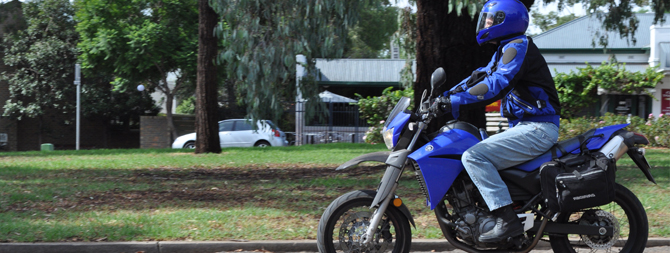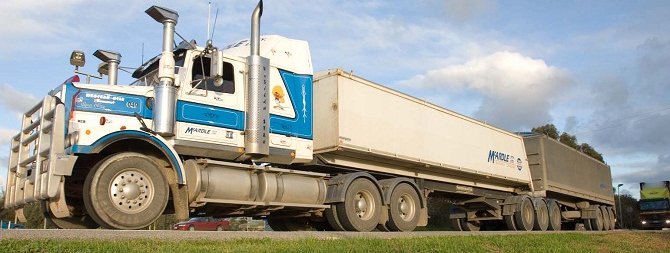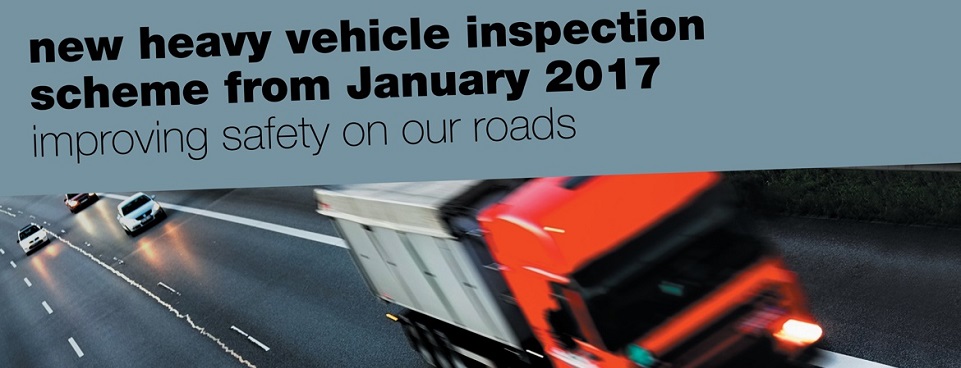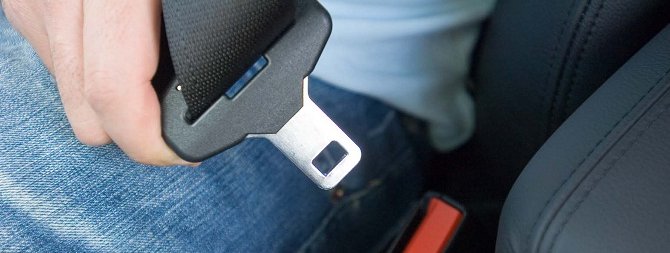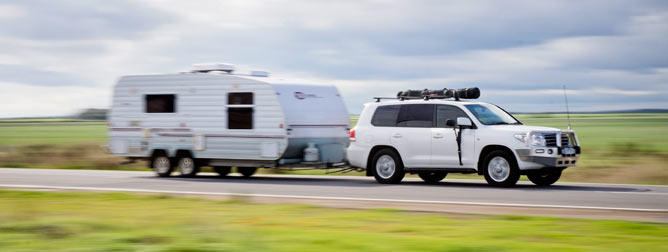Safer vehicles
Motorcycle ABS


Motorcycle Anti-lock Braking System (ABS)
Motorcycles are, by their nature, less stable than four wheeled vehicles. Braking too hard can destabilise a motorcycle. This can lead to either the front or rear wheel locking, which can cause the bike to overturn or slide. Alternatively failure to brake hard enough can result in a rider failing to avoid a crash.
The benefits of ABS are well recognised for cars. However, research indicates that ABS on motorcycles can have important safety benefits for riders. This section provides more information about motorcycle ABS and how it works.
How does an Anti-lock Braking System work on motorcycles?
ABS works to prevent a motorcycle's wheel, or wheels, from locking during braking. ABS uses speed sensors on both wheels to accurately determine wheel speed, as well as a control unit to determine when a wheel is about to lock. If the wheels are about to lock due to hard braking or slippery road conditions, the ABS hydraulic unit momentarily reduces the brake pressure applied by the rider, so that the wheels continue to rotate.
Motorcycle ABS constantly measures wheel speed, however it only intervenes to adjust brake pressure if it detects that a wheel is about to stop rotating. A rider shouldn’t notice this at all during normal, non-emergency braking but can be confident that in an emergency they can apply full brake force without the risk of wheels locking up.
This helps the rider to control the motorcycle, maintain stability and slow down safely.
Please refer to the image below for an example of a motorcycle anti-lock braking system.
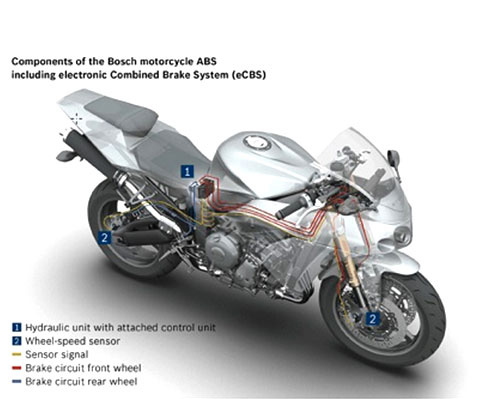
How effective is ABS?
A report by the Centre of Automotive Safety Research (CASR) on new motorcycle safety technology showed that if all South Australian motorcycles were fitted with ABS, it would result in an average annual reduction of seven motorcycle fatalities and 57 motorcycle serious injuries. The report also showed that ABS could reduce the overall stopping distance of a motorcycle by up to 17%.
In many circumstances ABS has been shown to reduce braking distance and motorcycles with ABS technology have been shown to be involved in fewer crashes on the road.
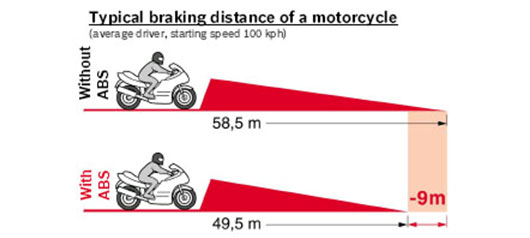
Most major motorcycle manufacturers now offer motorcycles with ABS as either standard or optional equipment.
If you are planning to buy a motorcycle to ride on-road, it is recommended that you buy one with ABS.
Motorcycle ABS – Improving rider safety
What's the difference between ABS on motorcycles and ABS on cars?
While the basic principles of ABS, i.e. preventing wheel lock up and skidding, are essentially the same for all vehicle types, braking is much more complex for riders than drivers.
Most motorcycles have separate front and rear brake controls. The brake controls help to balance the braking force applied to the front and rear wheels to ensure optimum braking.
If a wheel locks up on a car, this may result in the vehicle skidding. If a wheel locks up on a motorcycle, this can often result in a loss of balance, causing the motorcycle to fall.
Motorcycle ABS helps to prevent wheel lock up and therefore can keep the rider upright.
The technology can help to reduce braking distance and in the event of a crash, can reduce the impact of speed.
Can an experienced rider 'out brake' a motorcycle with ABS?
Under controlled conditions, a professional rider may be able to ‘out brake’ a motorcycle with ABS. The reality on roads is very different. The road environment can be unpredictable, due to the interaction with other road users, changing road surfaces and weather. All of these factors can add to the complexity of an emergency braking situation.
Does the ABS technology take control away from the rider?
No, the ABS system will only operate if it detects a wheel is about to lock. Under normal riding conditions you will not notice any difference.
Do I need additional training to ride a motorcycle with ABS?
No. A motorcycle with ABS will operate the same as motorcycle without ABS under normal conditions. ABS will only intervene under heavy braking, if it detects that a wheel is about to stop rotating.
Will ABS operate on all road surfaces?
Yes, ABS will operate on all types of road surface. Some bikes designed for off-road use may have advanced ABS which can be programmed for different riding conditions and also switched off.
Is ABS available on all motorcycles?
The range of motorcycles with ABS is increasing each year. ABS is currently available on a variety of makes and models throughout the different styles of motorcycle, such as: Scooter, Sports, Supersports, Naked, Touring and Cruiser.
What research is available about the effectiveness of motorcycle ABS?
Ponte G, Searson DJ, Royals J, Anderson RWG (2015) New motorcycle safety technology: an overview for South Australia (CASR127) , Centre for Automotive Safety Research, Adelaide.
Anderson RWG, Hutchinson TP, Linke BJ, Ponte G (2011) Analysis of crash data to estimate the benefits of emerging vehicle technology (CASR094) , Centre for Automotive Safety Research, Adelaide.
Eric R. Teoh (2011): Effectiveness of Anti-lock Braking Systems in Reducing Motorcycle Fatal Crash
Rates , Traffic Injury Prevention,12:2, 169-173.
Matteo Rizzi, Johan Strandroth & Claes Tingvall (2009): The Effectiveness of Anti-lock Brake Systems on Motorcycles in Reducing Real-Life Crashes and Injuries , Traffic Injury Prevention,10:5, 479-487.





















